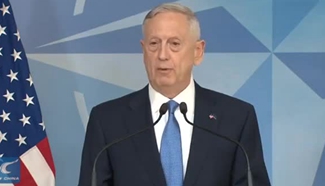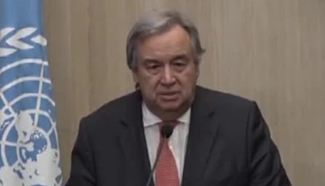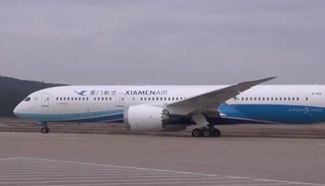BEIJING, Feb. 16 (Xinhua) -- The fast-growing and open China will remain a powerful magnet for foreign investment in spite of the temporary drop in foreign direct investment (FDI) last month over seasonal factors.
FDI inflow to the Chinese mainland dropped 9.2 percent year on year to 80.1 billion yuan (12 billion U.S. dollars) in January 2017, the Ministry of Commerce (MOC) said Thursday in a statement.
The figure was also lower than 81.42 billion yuan in December 2016.
MOC spokesperson Sun Jiwen said at a press conference that the year-on-year drop was mainly due to a high comparison base in the same month of 2016.
"Meanwhile, the Spring Festival holiday also led to the decline," Sun said.
Spring Festival, the Lunar New Year holiday, was in January this year and February last year. Chinese people enjoy a seven-day holiday around the festival.
The drop does not represent any trend for FDI inflow in the full year, as China still boasts strong favorable conditions for attracting foreign investment in the medium-to-long run, Sun added.
China's GDP grew 6.8 percent in the last quarter of 2016, higher than the 6.7 percent in the previous three quarters. Full-year growth was 6.7 percent, within the government target of between 6.5 and 7 percent.
The economy may grow at an average annualized rate of more than 6.5 percent in 2016-2020, still among the world's fastest-growing economies, Sun said.
China's competitiveness in absorbing investment will remain, as the nation expands domains of opening up, improves the modern market system and optimizes the business environment, Sun said.
In 2016, the country amended laws on foreign investment and unveiled measures to simplify approval procedures for foreign companies.
The country will build a law-based market environment and attract more foreign investment to give them a bigger role in China's economic development, according to the Central Economic Work Conference in December.
Despite the overall FDI decline last month, investment inflow to the high-tech manufacturing sector surged 39.9 percent, in sharp contrast to the 9.5-percent decline in the whole manufacturing industry.
FDI to high-tech service sector also registered an increase of 11 percent, compared with a decline of 9.3 percent for investment in service industry, MOC said.
Strong growth in the high-tech sector was in line with the direction of China's industrial upgrading, Sun said.
In January, 2,010 new foreign companies were established, slightly up by 0.1 percent from a year ago.
A report from the United Nations Conference on Trade and Development (UNCTAD) said that China received 139 billion dollars of FDI in 2016, third in the world behind the United States and Britain.
The figure was higher than 126 billion dollars reported by the MOC.
China will continue to be one of the most alluring destinations for foreign investment and its FDI will remain at a high level in 2017 due to its fast growth and easier access for foreign companies, according to James Zhan, a UNCTAD official in charge of investment and enterprise.
China's non-financial outbound direct investment (ODI) dropped 35.7 percent to 53.27 billion yuan in January, with Chinese companies investing in 983 overseas companies in 108 countries and regions, MOC said.
Chinese companies have paid special attention to the real economy and emerging industries during the process of outbound investment, Sun said.
The Belt and Road Initiative was a strong boost to cooperation between Chinese and foreign firms, with ODI to countries along the Belt and Road representing 10.6 percent of the total in January, up from a share of 8.5 percent in 2016.












